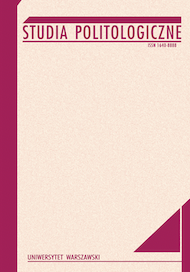Концептуальные направления политики
Республики Узбекистан в отношении
деятельноси международных
неправительственных организаций
Conceptual directions of the policy of the Republic of Uzbekistan in relation to the activities of international non-governmental organizations
Author(s): Dilmurod Zuhriddinovič ÈrnazarovSubject(s): Politics / Political Sciences, Politics, International relations/trade, Politics and society
Published by: Wydział Nauk Politycznych i Studiów Międzynarodowych UW
Keywords: state; INGOs; NGOs; civil society; modernization; democratization; social partnership; international relations
Summary/Abstract: The role and importance of international non-governmental organizations (INGOs) in solving global problems, developing human rights, democratic principles, reforms, modernizing public life and developing a global civil society is constantly increasing. INGOs have become new actors in the system of world politics and international relations. There was a need to study the activities of INGOs around the world in the field of history, law, sociology, philosophy, political science. In recent years, many INGOs have appeared in the world, and they work in all countries of the world in such priorities as ensuring human rights, freedom of speech, the economy, the social sphere, the environment, etc. Today, there is an increasing need for a comprehensive study of the activities of INGOs, trends in their increase in the number and rapid growth, influence on the domestic and foreign policies of states and in shaping the global political agenda. The emergence of global problems and the lack of strength and political will of some countries to solve them slow down the integration processes around the world. Especially, there is a need for cooperation in the issues of democratization, liberalization and modernization of public administration and public life. Therefore, today the role and participation of INGOs in solving such issues is increasing. An important result of INGO activity is constructivism and pragmatism.
Journal: Studia Politologiczne
- Issue Year: 66/2022
- Issue No: 66
- Page Range: 469-482
- Page Count: 14
- Language: Russian

